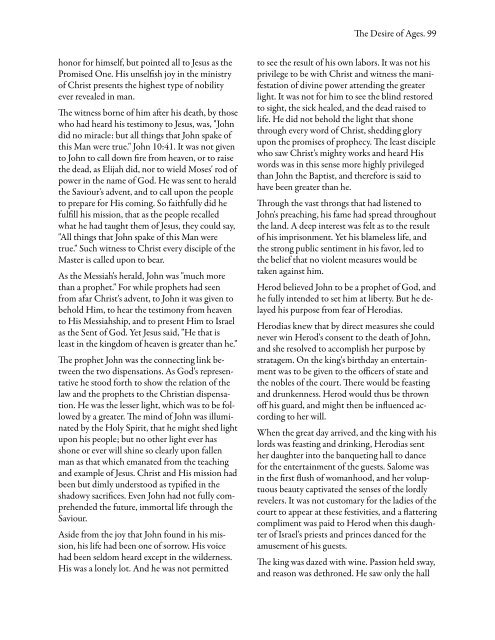The Desire of Ages - Christian Freebies
The Desire of Ages - Christian Freebies
The Desire of Ages - Christian Freebies
Create successful ePaper yourself
Turn your PDF publications into a flip-book with our unique Google optimized e-Paper software.
honor for himself, but pointed all to Jesus as the<br />
Promised One. His unselsh joy in the ministry<br />
<strong>of</strong> Christ presents the highest type <strong>of</strong> nobility<br />
ever revealed in man.<br />
e witness borne <strong>of</strong> him aer his death, by those<br />
who had heard his testimony to Jesus, was, "John<br />
did no miracle: but all things that John spake <strong>of</strong><br />
this Man were true." John 10:41. It was not given<br />
to John to call down re from heaven, or to raise<br />
the dead, as Elijah did, nor to wield Moses' rod <strong>of</strong><br />
power in the name <strong>of</strong> God. He was sent to herald<br />
the Saviour's advent, and to call upon the people<br />
to prepare for His coming. So faithfully did he<br />
fulll his mission, that as the people recalled<br />
what he had taught them <strong>of</strong> Jesus, they could say,<br />
"All things that John spake <strong>of</strong> this Man were<br />
true." Such witness to Christ every disciple <strong>of</strong> the<br />
Master is called upon to bear.<br />
As the Messiah's herald, John was "much more<br />
than a prophet." For while prophets had seen<br />
from afar Christ's advent, to John it was given to<br />
behold Him, to hear the testimony from heaven<br />
to His Messiahship, and to present Him to Israel<br />
as the Sent <strong>of</strong> God. Yet Jesus said, "He that is<br />
least in the kingdom <strong>of</strong> heaven is greater than he."<br />
e prophet John was the connecting link between<br />
the two dispensations. As God's representative<br />
he stood forth to show the relation <strong>of</strong> the<br />
law and the prophets to the <strong>Christian</strong> dispensation.<br />
He was the lesser light, which was to be followed<br />
by a greater. e mind <strong>of</strong> John was illuminated<br />
by the Holy Spirit, that he might shed light<br />
upon his people; but no other light ever has<br />
shone or ever will shine so clearly upon fallen<br />
man as that which emanated from the teaching<br />
and example <strong>of</strong> Jesus. Christ and His mission had<br />
been but dimly understood as typied in the<br />
shadowy sacrices. Even John had not fully comprehended<br />
the future, immortal life through the<br />
Saviour.<br />
Aside from the joy that John found in his mission,<br />
his life had been one <strong>of</strong> sorrow. His voice<br />
had been seldom heard except in the wilderness.<br />
His was a lonely lot. And he was not permitted<br />
e <strong>Desire</strong> <strong>of</strong> <strong>Ages</strong>. 99<br />
to see the result <strong>of</strong> his own labors. It was not his<br />
privilege to be with Christ and witness the manifestation<br />
<strong>of</strong> divine power attending the greater<br />
light. It was not for him to see the blind restored<br />
to sight, the sick healed, and the dead raised to<br />
life. He did not behold the light that shone<br />
through every word <strong>of</strong> Christ, shedding glory<br />
upon the promises <strong>of</strong> prophecy. e least disciple<br />
who saw Christ's mighty works and heard His<br />
words was in this sense more highly privileged<br />
than John the Baptist, and therefore is said to<br />
have been greater than he.<br />
rough the vast throngs that had listened to<br />
John's preaching, his fame had spread throughout<br />
the land. A deep interest was felt as to the result<br />
<strong>of</strong> his imprisonment. Yet his blameless life, and<br />
the strong public sentiment in his favor, led to<br />
the belief that no violent measures would be<br />
taken against him.<br />
Herod believed John to be a prophet <strong>of</strong> God, and<br />
he fully intended to set him at liberty. But he delayed<br />
his purpose from fear <strong>of</strong> Herodias.<br />
Herodias knew that by direct measures she could<br />
never win Herod's consent to the death <strong>of</strong> John,<br />
and she resolved to accomplish her purpose by<br />
stratagem. On the king's birthday an entertainment<br />
was to be given to the ocers <strong>of</strong> state and<br />
the nobles <strong>of</strong> the court. ere would be feasting<br />
and drunkenness. Herod would thus be thrown<br />
o his guard, and might then be inuenced according<br />
to her will.<br />
When the great day arrived, and the king with his<br />
lords was feasting and drinking, Herodias sent<br />
her daughter into the banqueting hall to dance<br />
for the entertainment <strong>of</strong> the guests. Salome was<br />
in the rst ush <strong>of</strong> womanhood, and her voluptuous<br />
beauty captivated the senses <strong>of</strong> the lordly<br />
revelers. It was not customary for the ladies <strong>of</strong> the<br />
court to appear at these festivities, and a attering<br />
compliment was paid to Herod when this daughter<br />
<strong>of</strong> Israel's priests and princes danced for the<br />
amusement <strong>of</strong> his guests.<br />
e king was dazed with wine. Passion held sway,<br />
and reason was dethroned. He saw only the hall


